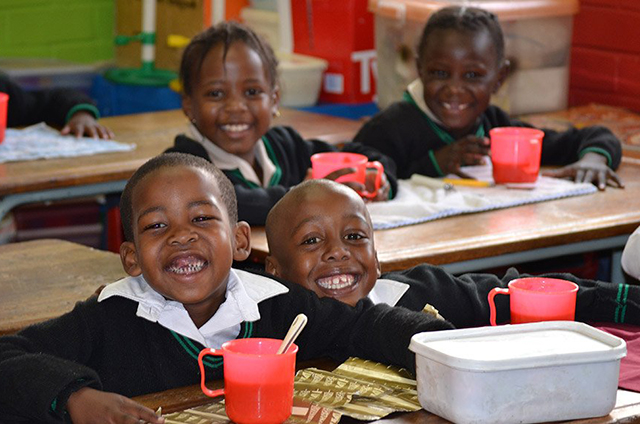Media statement
3 September 2024
The Tiger Brands Foundation (TBF) has partnered with Bokashi Bran to integrate composting into its in-school nutrition programme to not only enhance the nutritional impact of this initiative but also promote environmentally sustainable practices.
Established in 2012, Bokashi Bran’s mission is to keep food waste out of landfills and produce the highest quality Bokashi compost possible. Bokashi is a process that converts food waste and similar organic matter into a soil additive that provides nutrients and improves soil texture.
TBF Director Eugene Absolom says the partnership aims to implement Bokashi composting systems at schools participating in the Foundation’s nutrition programme. This will involve leveraging organic waste to plant and feed in-school gardens, further enhancing the nutritional impact of the in-school breakfast programme.
Millions of South African learners from poor and vulnerable communities rely on the government’s National School Nutrition Programme (NSNP) for their daily source of nutrition. The programme is supported by organisations such as the TBF, which provides a healthy, nutritious breakfast every school day to thousands of learners at disadvantaged schools across South Africa. The TBF’s in-school breakfast initiative runs in tandem with the NSNP.
“By teaming up with Bokashi Bran, we will promote environmental awareness and sustainable practices among learners, as well as drive the synergy between nutrition, sustainability and community development,” says Absolom.
“Bokashi Bran has revolutionised the effectiveness of the green economy over the past 12 years by making food waste recycling a way of the future where valuable resources are put back into the environment and economy for continual use.”
He explains that the Bokashi composting process is simple, yet effective, and utilises organic waste collected from school kitchens and cafeterias. Learners can actively participate in diverting waste from landfills and transforming it into nutrient-rich compost. This compost, in turn, serves as a valuable resource for in-school gardens, providing fertile soil for growing fruit, vegetables and herbs.
“The integration of composting into our nutrition programme offers a multitude of benefits beyond just addressing malnutrition. It provides learners with hands-on learning opportunities about environmental stewardship and sustainable agriculture. Additionally, by being involved in the process of growing their own food, learners will gain a deeper appreciation for healthy eating habits and food security,” says Absolom.
He points out that the partnership with Bokashi Bran will also address the problem of food waste, which has become an increasingly serious environmental concern due to the high levels of methane gas that rotting food waste emits at landfill sites and the contamination of groundwater that it can cause.
“Additionally, rotting food waste is also a major carrier of diseases including salmonella, Listeria monocytogenes and E. coli, which can pose major threats to the health of South African citizens in many rural communities. We are confident that these concerns can be addressed by the Bokashi Bran® system where the effective micro-organisms eliminate all these pathogens and prevent food waste from rotting,” Absolom concludes.

